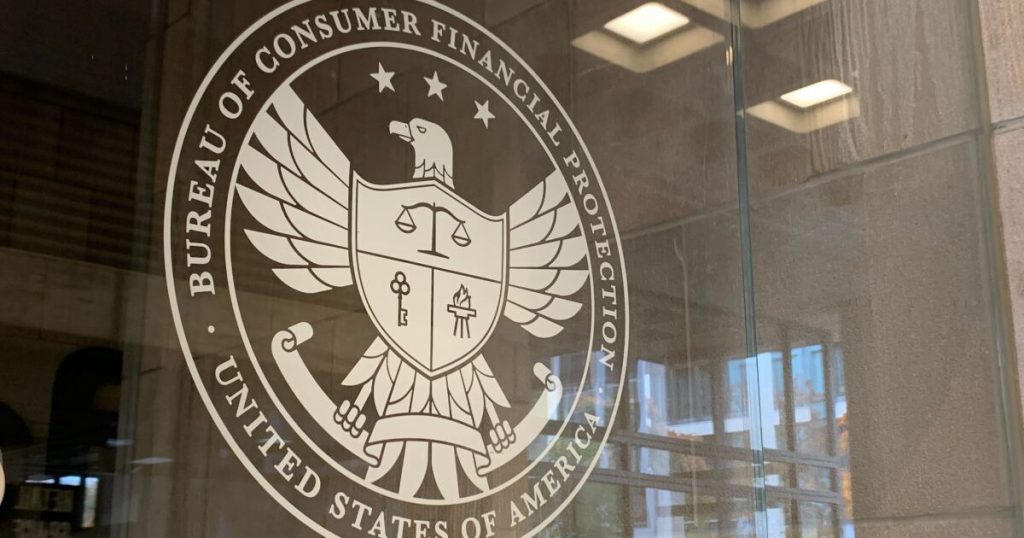- Key insight: The Department of Justice filed a motion opposing a Consumer Financial Protection Bureau employee union’s appeal of a DC Circuit ruling allowing the administration to fire hundreds of agency workers.
- What’s at stake: The CFPB employee union has been arguing that the administration is seeking to shut down the agency, something that only Congress has the power to do.
- Forward look: The outcome of the case could have important implications for similar mass firings taking place across the federal government as Congress’ budget deadlock enters its fourth week.
The Consumer Financial Protection Bureau urged a federal appeals court to deny a motion by the agency’s employee union to rehear arguments about whether the Trump administration’s planned layoffs amount to an attempt to shut down the agency.
The Department of Justice on Tuesday
The Justice Department had initially asked for an extension due to the government shutdown. But on Friday, the D.C. Circuit rebuffed the request and ordered the administration to respond by the original filing date.
The case is being closely watched, not just for its implications for the CFPB and its employees, but also for the broader impact of actions taken by agency heads that are not officially made in writing. At issue is whether government officials can shut down an agency if their plan is not explicitly laid out in an official memo or policy.
The DOJ acknowledged in its
The DOJ said that the CFPB’s union “inferred” there was an overarching decision from various actions taken by Vought to downsize the agency, and that nothing was officially stated in writing. The union
The union claimed that Vought had hatched a plan to shut down the CFPB, which can only be done by an act of Congress. The DOJ countered that Vought’s actions did not constitute a policy or official action, and therefore, was not reviewable by the courts under the APA. The three-judge panel of the D.C. Circuit agreed.
“This posited decision is not in any ‘regulation, order, document, email, or other statement, written or oral, purporting to shut down the CFPB,” the DOJ stated. “The panel correctly concluded that abstract plans to take future action are not reviewable under the APA.”
“Consistent with precedent, the panel’s opinion reflects only that there was no final, ripe, and discrete action, and that the absence of any embodiment or announcement of a purported agency decision is merely relevant to — not dispositive of — the APA inquiry,” the DOJ said.
In May, a district court heard oral arguments and
U.S. District Judge Amy Berman Jackson issued a wide-ranging injunction that required Vought to reinstate all probationary and term employees and barred the CFPB from firing any employee “except for cause,” or from instituting any work stoppage. She also ordered the rescission of all contract terminations, as well as various provisions mandating employee access to office space and remote-work.
The union had also challenged Vought’s Feb. 10 “stop work” order, which the appeals panel ruled was also not a reviewable final agency action. The D.C. Circuit appeals panel, in a 2-1 decision with two Trump-appointed judges siding with the Trump administration, and one Obama-appointee dissenting, ruled that Vought could fire up to 90% of the agency’s employees. The CFPB currently has about 1,400 employees and senior CFPB officials have said they can run the agency with just 200.
The saga of the beleaguered CFPB is similar to other partisan showdowns playing out in court as the Trump administration
Last week, Vought said in an interview on “The Charlie Kirk Show” that the administration will issue RIFs at other agencies as long as the government shutdown continues. He also said that he thinks he will be successful in shutting down the CFPB “within the next two to three months.”
The DOJ even said that the union can file a lawsuit if the agency fails to fulfill its lawful requirements — but must wait until after employees have been fired.
“Should CFPB unlawfully cease performing its mandatory statutory duties, plaintiffs may challenge such a failure within the APA’s well-established limits,” the DOJ brief states. “Plaintiffs’ dissatisfaction with those limits is hardly a reason for the en banc court to intervene. The petition for rehearing en banc should be denied.”

